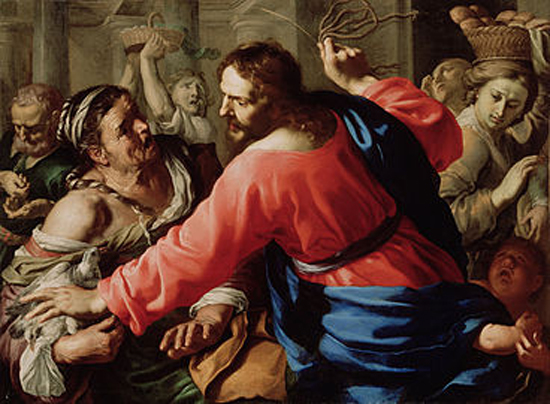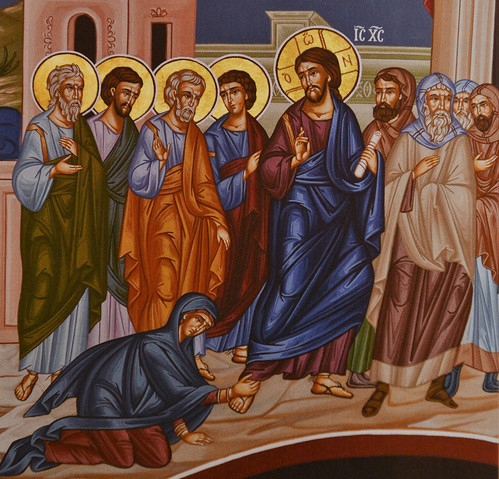Christian Art | Boy At Prayer With Jesus | Eucharist And The Cross
Office Of Readings | Eastertide Week 2, Wednesday | A Reading From The Sermon Of Pope Saint Leo The Great
‘Jesus Christ lives in his Church.’
‘Christ Lives in His Church’ | Saint Leo The Great
In this sermon, Saint Leo the Great invites us to contemplate one of the deepest mysteries of Christian faith: the living presence of Christ in his Church. Leo’s message is profoundly Eucharistic, ecclesial, and incarnational—rooted in both Scripture and the lived experience of Christian community. Though composed in the fifth century, Leo’s words continue to resonate with clarity and pastoral care.
Jesus Christ And The Church: One Living Body
Leo begins by affirming the inseparability of Christ from his Church. ‘The head cannot be separated from the members, nor the members from the head,’ he writes. Here, Leo draws on the familiar Pauline image of the Church as the Body of Christ (cf. 1 Corinthians 12:12–27; Ephesians 1:22–23). For Leo, this is no mere metaphor. The Church is not simply an institution that represents Christ—it is, in a mystical but real sense, Christ himself living in the world.
This reality is grounded in the Incarnation. Christ, having united himself permanently with human nature, continues to dwell in those who are united to Jesus by grace. This includes all the saints, not just those canonized or famous, but every baptized believer. Even now, Leo says, God dwells ‘whole and undivided’ in His Church. Christ has not abandoned us. Jesus’ promise—’I am with you always, even to the end of the world’ (Matthew 28:20)—is still being fulfilled.
The Church As The Virgin Mother
Saint Leo shifts naturally into describing the Church’s fruitfulness. Just as Christ was born of the Virgin Mary by the power of the Holy Spirit, so too he is continually born in the Church through the sacraments, especially baptism. This imagery is rich and poetic: the Church as a virgin mother who, through the action of the Spirit, gives birth to countless children of God. The faithful are ‘born not of blood, nor of the desire of the flesh, nor of the will of man, but of God’ (cf. John 1:13).
For Leo, baptism is more than a symbolic initiation. It is the real beginning of divine life in the soul. This new birth incorporates the believer into Christ, and through him, into the global family of Abraham’s children. Thus, Leo also highlights the universality of salvation: ‘From every nation on earth, without exception, Christ forms a single flock.’ This vision of the Church as one flock under one shepherd echoes Jesus’ own words in John 10:16 and testifies to the unity of the Church across all cultures and peoples.
Role Of Peter And The Pastors
Although Saint Leo is careful to affirm Peter’s unique role—Christ’s special command to him to ‘feed my sheep’—he also emphasizes that Christ remains the true shepherd. All bishops and pastors serve under Christ’s authority, not above it. They are not the source of grace, but the stewards of it.
This is an important clarification. The unity of the Church, even in its hierarchical structure, is ultimately Christological, not bureaucratic. Christ himself nourishes his flock with ‘abundant love’, and it is Jesus Christ who leads both the shepherds and the sheep to ‘rich and fertile pastures’. In Leo’s time, this was a pastoral encouragement in the face of political and doctrinal unrest, reminding the faithful that the Church’s true anchor is not in any worldly structure but in Christ himself.
All Share In The Passion Of Christ
Saint Leo makes an extraordinary claim: not only martyrs, but all the baptized, ‘share in his passion’. This extends the theology of the cross to every Christian life. By baptism, believers have died and risen with Christ (Romans 6:3–5). Therefore, every Christian is called to imitate Christ’s self-giving love. This is not restricted to moments of heroic martyrdom but is lived daily in faith, patience, humility, and fidelity.
Thus, the Christian life is paschal in nature. It is shaped by Christ’s Passover from death to life, and our own transformation into ‘a new creature’ is a participation in that mystery. Baptism is not the end of the journey but the beginning of a lifelong process of dying to sin and rising to holiness.
The Eucharist | Becoming What We Receive
In one of the most striking passages, Leo teaches:
‘The effect of our sharing in the body and blood of Christ is to change us into what we receive.’
This is both mystical and profoundly Eucharistic. In receiving the Body of Christ, we do not simply take Christ into ourselves. Rather, we are taken up into Jesus. The Eucharist is not merely a ritual act or an object of devotion; it is a sacrament that reshapes the one who receives it. We become Christ-like—not just metaphorically, but really and spiritually—by grace. This doctrine of transformation is echoed later in the Eastern idea of theosis, and in the Western emphasis on sanctifying grace.
Feast Of Sincerity And Truth
Leo closes by connecting this sacramental participation to moral and spiritual renewal. The paschal mystery is not a moment in history to be remembered; it is a living reality to be celebrated ‘with the unleavened bread of sincerity and truth’. He is paraphrasing 1 Corinthians 5:8, where Saint Paul encourages the faithful to live the new life of Christ with purity and authenticity.
For Leo, this means casting aside the ‘leaven of malice’, that is, the habits and sins of the old self. The Christian is a ‘new creature’, filled and ‘inebriated with the Lord Himself’. The joy of Easter, then, is not simply about what Christ did—but about what He is still doing, in us and through us.

A Reading From The Sermon Of Pope Saint Leo The Great
My dear brethren, there is no doubt that the Son of God took our human nature into so close a union with himself that one and the same Christ is present, not only in the firstborn of all creation, but in all his saints as well. The head cannot be separated from the members, nor the members from the head. Not in this life, it is true, but only in eternity will God be all in all, yet even now he dwells, whole and undivided, in his temple the Church. Such was his promise to us when he said: See, I am with you always, even to the end of the world.
And so all that the Son of God did and taught for the world’s reconciliation is not for us simply a matter of past history. Here and now we experience his power at work among us. Born of a virgin mother by the action of the Holy Spirit, Christ keeps his Church spotless and makes her fruitful by the inspiration of the same Spirit. In baptismal regeneration she brings forth children for God beyond all numbering. These are the sons of whom it is written: They are born not of blood, nor of the desire of the flesh, nor of the will of man, but of God.
In Christ Abraham’s posterity is blessed, because in him the whole world receives the adoption of sons, and in him the patriarch becomes the father of all nations through the birth, not from human stock but by faith, of the descendants that were promised to him. From every nation on earth, without exception, Christ forms a single flock of those he has sanctified, daily fulfilling the promise he once made: I have other sheep, not of this fold, whom it is also ordained that I shall lead; and there shall be one flock and one shepherd.
Although it was primarily to Peter that he said: Feed my sheep, yet the one Lord guides all the pastors in the discharge of their office and leads to rich and fertile pastures all those who come to the rock. There is no counting the sheep who are nourished with his abundant love, and who are prepared to lay down their lives for the sake of the good shepherd who died for them.
But it is not only the martyrs who share in his passion by their glorious courage; the same is true, by faith, of all who are reborn through baptism. That is why we are to celebrate the Lord’s paschal sacrifice with the unleavened bread of sincerity and truth. The leaven of our former malice is thrown out, and a new creature is filled and inebriated with the Lord himself. For the effect of our sharing in the body and blood of Christ is to change us into what we receive. As we have died with him, and have been buried and raised to life with him, so we bear him within us, both in body and in spirit, in everything we do.








